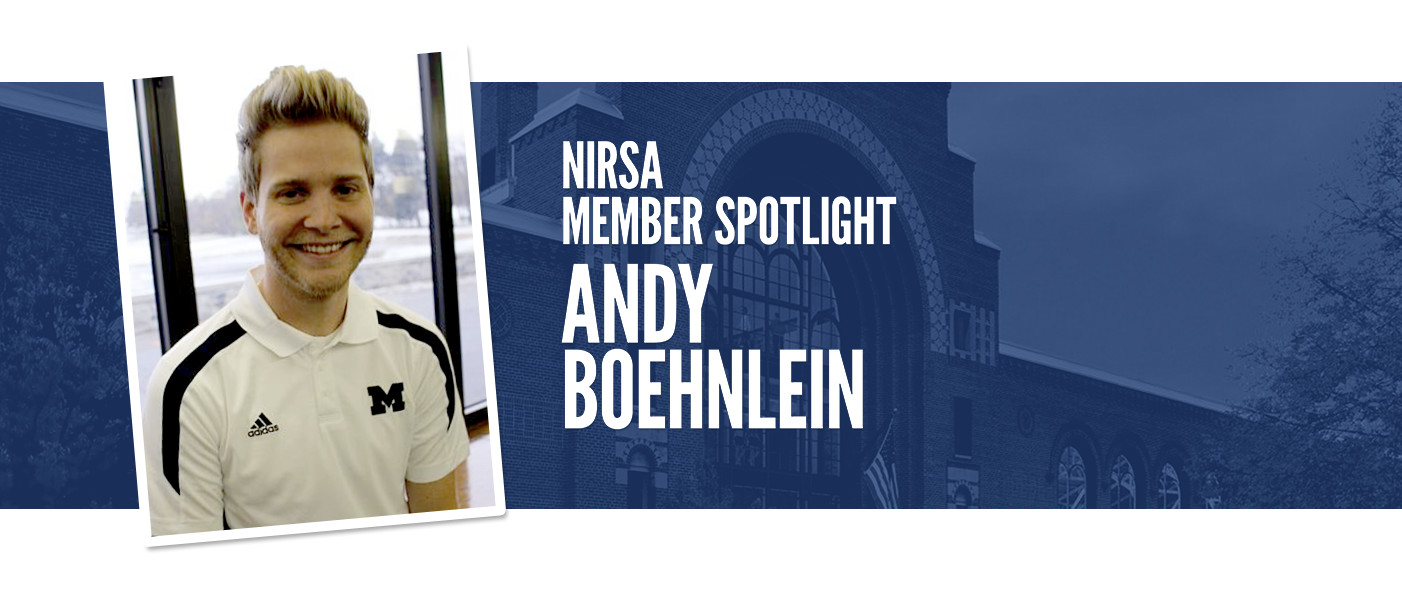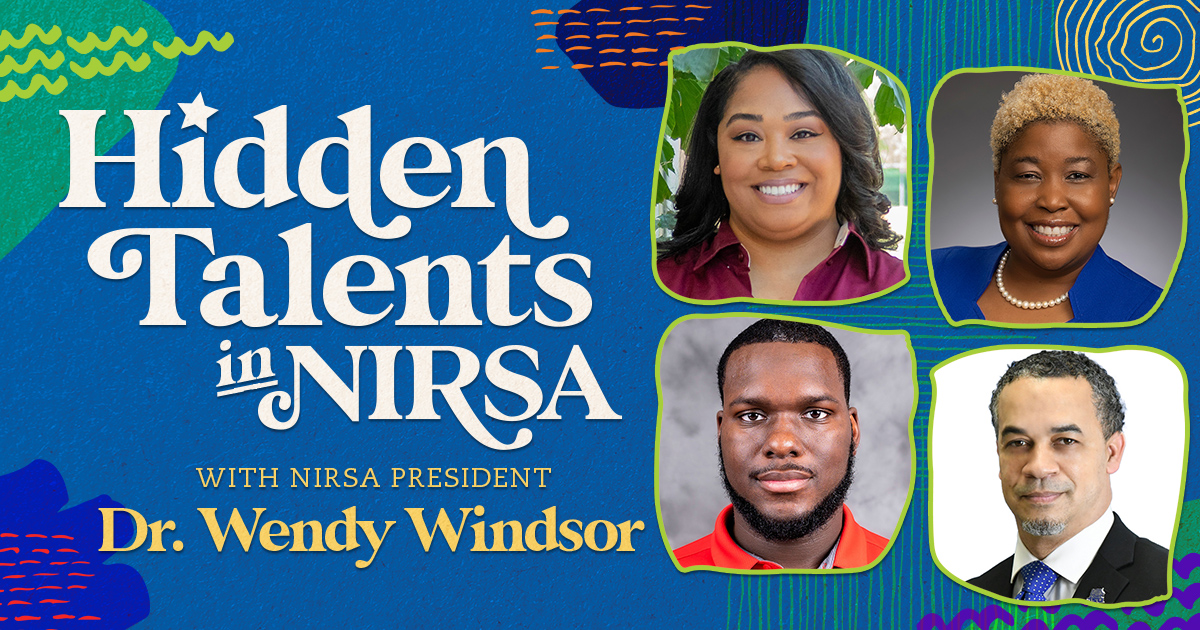By Scott Flickinger, Director of Intramural Sports, at Cornell University and NIRSA Championship Series Brand Management Work Team Chair
For many years, I’ve had the distinct pleasure to work with NIRSA professional Andy Boehnlein at many NIRSA Championship Series events and Association functions. In addition to being someone who genuinely cares about the development of students and professionals in our field, he has always struck me as an individual who happily marches to a beat few of us hear.
He always seems to have such a quick wit and some of the best comedic timing I’ve encountered. I’ve often wondered if people like him get noticed and asked how they came into the position they are currently in. Sometimes, I feel we all just assume we have similar backgrounds when it comes to growing up in campus recreation. Sometimes we lack the curiosity to notice an individual and say “What makes that person tick? I’d like to know more about them and why they chose campus recreation. Give me the story.”
After seeing Andy involved in the Region III Flag Football Officials Workshop, and hearing about his keynote address at the Michigan Intramural-Recreational Sports Association workshop (MIRSA), I was sold on interviewing and writing about him because I felt people had to know about this jocular and dedicated professional. Frankly, I also wanted to know more about him because his personality and demeanor are engaging—and that is such a boon in student development.
I won’t lie to you, my good NIRSA professionals and students. Writing an opening to an article featuring a talented and ardent administrator is difficult. The first few sentences are critical when it comes to luring and retaining potential readers. It’s the difference between the discovery of an outstanding individual and disinterest due to boredom. After all, we’re taught that first impressions are everything—if not the only thing. So, without further ado, let me get your attention with the following: Andy used puppets to teach flag football rules at a workshop and has a unicorn named Ulysses.
Did I do it? Trust me, I’ve got more. You’ll see.
Andy used puppets to teach flag football rules at a workshop and has a unicorn named Ulysses.
Andy Boehnlein has been the Coordinator for Intramural Sports & Summer Camps in the Office of Recreational Sports at the University of Michigan-Ann Arbor since 2014, where he also happened to complete an internship before earning his master’s degree at the University of Akron. Prior to all of this, from 2008 to 2011, he was an undergraduate at the University of Dayton in their intramural sports program.
When it came to his start in campus recreation, Andy’s path was, well, pedestrian. “I was a sophomore Sport Management major at Dayton, and I had to do a semi-internship work-study thing with someone,” says Andy. “And it just so happened I got paired up and got to do the intramural captains meeting. So we were signing people into the captains meeting, and Mark Hoying—the Intramural Coordinator at that point—said that if we memorized the flag football rules, he would get us extra credit for the class. So I did. And never got my extra credit. But I did get a job out of it. I’ve been working in campus rec and hooked ever since.”
This isn’t exactly where Andy got his start though. “So originally, I got my start in campus activities,” Andy explains. “I used that background along with intramurals to delve a little deeper into campus recreation. I was an official, then a supervisor, and then my senior year—with the activities background—Mark and I talked and came up with our new weekend tournament program. We came up with some different late-night tournaments that got a big push as alternative programming. These merged my two backgrounds and seemed to work.” It sounds like how most of your average campus recreation professionals begin their career.
But here’s where Andy breaks away from average. Since I knew about his internship at Michigan, I asked him about that experience. “So after I realized I wasn’t going to be a famous comedian, I figured campus recreation was a good spot for me to end up,” says Andy. “So I ended up at Michigan. They were going through a transition in their intramural program, so I came in as a stop-gap to assist with the transition. I was given the reins to be creative and that’s where we came up with ideas like “Stuff Intramural Athletes Say”—which was popular on YouTube—and to get more items online including the captains meeting. It was a great experience.”
The words “famous comedian” resonated with me. In working with Andy, I had heard him mention before that he once interned with The Second City, one of the most famous—if not the most famous—improvisational and sketch comedy troupes in the United States and Canada. Based in Chicago, Second City has been around since the 1950s, and it has produced one famous comedian after another: John Belushi, John Candy, Dan Aykroyd, Gilda Radner, Tina Fey, Jane Lynch, Stephen Colbert. You get the idea. Some of the greatest minds in comedy hail from this troupe—and Andy interned there!
“I wouldn’t call it an internship. I like to refer to it as a study-abroad,” says Andy. “So I got my start senior year of undergrad, and was essentially dared to try stand-up—and so I did and loved it. Then there was an on-campus variety show that I was a part of. There was another girl that was also a part of it, and her big dream was to end up on Saturday Night Live. So she found this Second City program— which was essentially a study-abroad program where you went to Chicago and got credit through Columbia College.”
“You take classes on improv, writing, acting, and all of these different things. She applied and didn’t want to do it alone so she asked me to apply. I applied and figured ‘Why not? I’m not going to get in so it doesn’t really matter,” he explains. “Then, two weeks later, I got in and figured ‘What the heck?’ So I went to Chicago for six months to study acting, writing, current events—just immersing myself in comedy culture and what that means in Chicago.”
It was one of the most interesting things I’ve ever done. Being around thirty other like-minded people was eye-opening. It really showed how many different backgrounds funny people can come from.” Andy has incorporated much of his comedic stylings into his leadership roles as a campus recreation administrator. Yes, he has indeed used puppets to teach dead-ball foul at a flag football workshop. Yes, he has indeed created promotional videos for Michigan Intramural Sports such as “Stuff Intramural Athletes Say” and “If George Scott Baker is a demotivational speaker with a simple take on leadership and life: “Why Be Perfect, When You Can Be Average.” His ill-fitting wire-rim glasses, textured coif, and loud plaid suits have made waves in recent months—particularly at the MIRSA workshop as the keynote speaker. With his unicorn Ulysses at his side, George repeatedly goes over the very mantra that has led him to “success.” George, of course, is the brain-child of Andy who got the idea for him during his study abroad at Second City. “George was born in Chicago,” he says, “and just like any good comedy bit was born for one sketch and had about six lines. So throughout Chicago, I worked on him a little bit, worked on what he would look like outside of this one sketch” So, what does George Scott Baker stand for? “So the whole presentation—and all of the presentations—are essentially to make people think without them thinking that they’re thinking,” explains Andy. I asked him to run that by me again. “It gets a lot deeper than just being average in that the character subconsciously focuses the audience on ‘What do we think average actually is?’—and how much are we comparing ourselves to unattainable goals. So George Scott Baker is about getting people to understand that flaws are okay, getting people to understand that you should do your best and do you—and everything else will follow. That’s it’s okay you’re not perfect,” continues Andy. “It’s okay that your life’s not all together; life still goes on, and you’re allowed to enjoy it.” It’s a philosophy that isn’t meant for just campus recreation. It’s one meant for all situations—for the people that feel all aspects of life, down to the minutiae, must be in rank and file for life to be enjoyable. It doesn’t have to be, and that’s okay. I’ve heard George and he is an exceptional speaker. Plus, it makes for a great show. His next engagement? Keynote speaker at the 2016 Region III Student Lead On Conference taking place from January 28–30. No joke. Andy has put himself out there in terms of his style. Unorthodox techniques in teaching—again, puppets people, the guy used puppets—energetic engagement, and a sense of humor and presence have allowed him to connect with others. All of these things have served as his calling card to success. He attributes these elements to what he had learned in Chicago: “I took this quote from one of my teachers in Chicago. The quote is ‘If you are entertained, then you will be entertaining.’” I use that in trainings in that if I’m entertained by what we are learning then I will be entertaining in teaching whatever it is I’m teaching. People will reflect your energy, so if you bring it then people will be excited for what you’re doing. I think that gets lost sometimes. We’re not trying for world peace here. We’re trying to have fun, and that’s important.” So what is the big message for Andy? What is the one thing that he, as a leader, wants to convey to those willing to listen? Try. “You’re going to fail. You’re going to mess up. But you’re not going to learn anything unless you try. Thomas Edison said it best: ‘I didn’t fail. I’ve just found 10,000 ways that won’t work.’ We see that in students all the time,” says Andy. “Their learning styles are so different, and their communication styles are so different, and their programming styles are too. If we tell them what to do, they’re not going to learn anything. It’s giving them problems and saying, ‘Here. Fix this and give me some ideas.’ Giving them opportunities to try things without the cookie-cutter answer.” Given many of the styles I have seen from him, this answer was no surprise. The next statement wasn’t either: “It’s not finding the right answers but that we’re asking the right questions. If you’re asking the same question over and over again and expecting different answers, you’re not going to get them. Sometimes we don’t ask the right questions, and it’s because we don’t know what the actual problem is. I think my style is trying to find the actual problem we are trying to solve, then asking the right questions so we can get the answers we need.” It is absolutely fantastic to see a professional use their past experiences and a great energetic attitude to positively shape the world around them. It’s even more enjoyable to see them do it in a way that is entertaining for all who experience it. Andy Boehnlein fulfills both of those statements in his work life, and does so while leaving a smile on your face. His passion for student development and flair for the unique will always hold your attention. The next time you are at a conference or workshop, and you happen to see a man walking by with a unicorn on a stick or co-presenting a rules clinic with a goofy button-eyed animal, go check him out. Laugh, enjoy, and be engaged by what you are experiencing. Go learn something in a way you never thought you would. Go and be entertained.“If you are entertained by what you are doing on-stage,” Andy says, “then people will be entertained by watching you, and you will be entertaining.”
For more information about having your story featured on the NIRSA website, email NIRSA Communications Coordinator Nazifa Islam.





